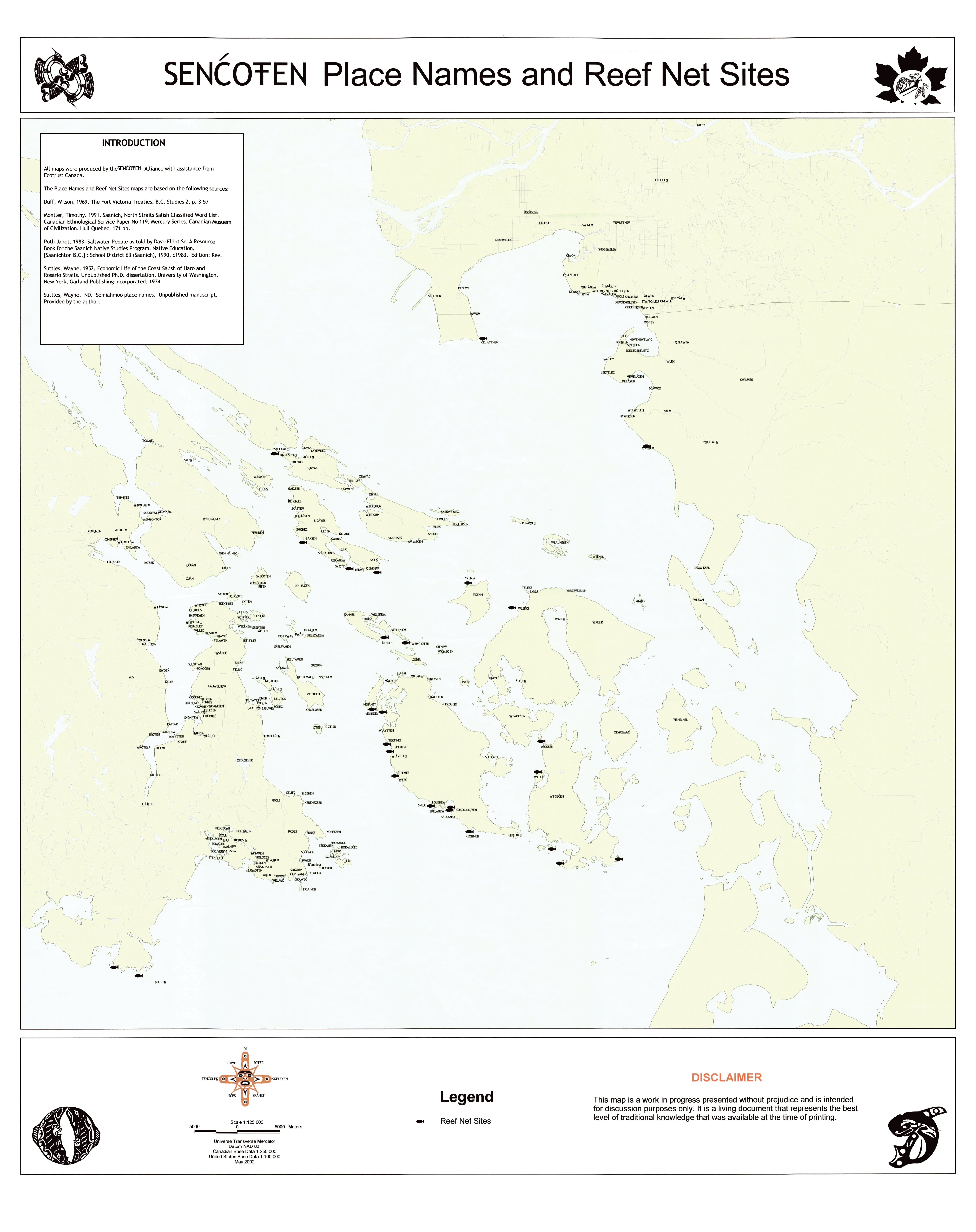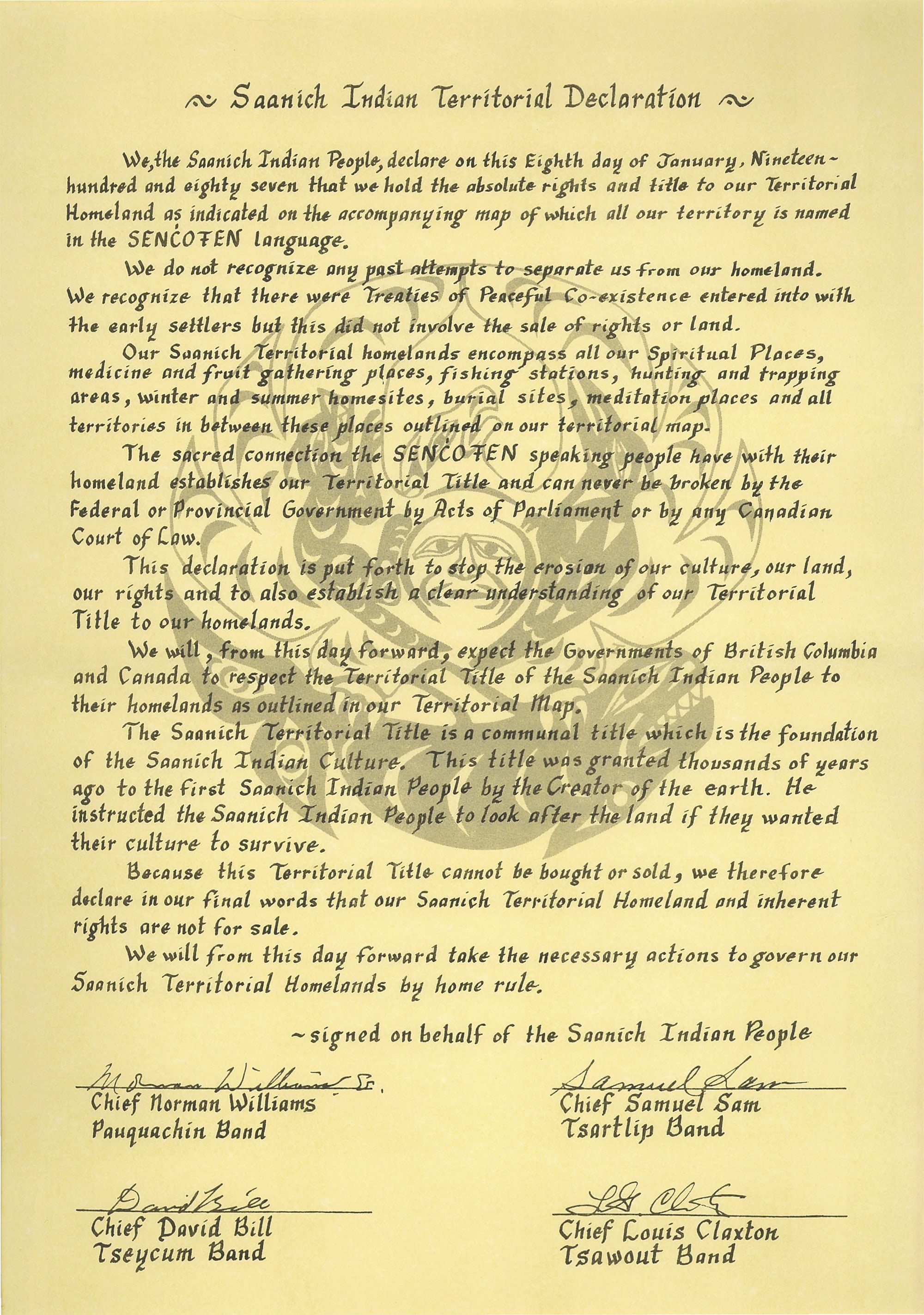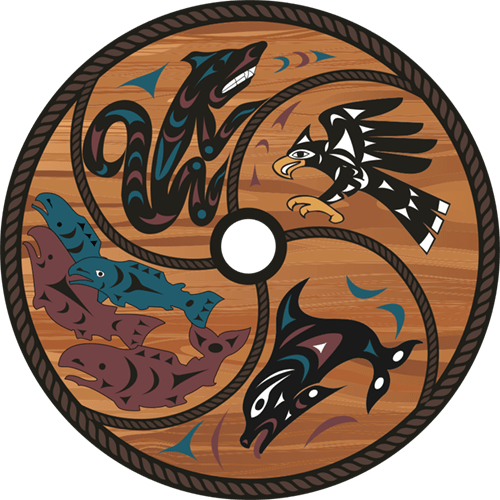RESOURCES FOR SETTLERS
Settlers who are interested in allyship with W̱SÁNEĆ people will find the resources on this page a great place to support the journey to reconciliation.
Below you’ll find resources in a suggested order for those on the first steps of this journey.
- Familiarize yourself with the WLC Press Policy, including suggested donations for media inquiries for information, quotes, and soundbites by community members.
- Learn about the W̱SÁNEĆ Lands Trust and how it helps future generations of W̱SÁNEĆ access land for cultural purposes and to positively impact the environment through W̱SÁNEĆ stewardship.
- Find out what Indigenous Territory you live and work on, and get information on how to properly create a territorial acknowledgement.
- Learn how to pronounce the names of the First Nations and the languages they speak.
- Choose some materials to work through from the suggested reading list to take the all-important step of being responsible for your own education on Indigenous issues. Learn about the culture of W̱SÁNEĆ people, the history of colonialism, and paths toward reconciliation.
- Consider making regular financial contributions to various local community organizations that can help provide W̱SÁNEĆ people with much-needed resources for education, athletics, and cultural initiatives.
WLC Press Policy
What is the WLC Press Policy?
As information and interest in Reconciliation have grown, Indigenous people—both individually and collectively—are increasingly sought after to answer questions, offer specific cultural insights, and provide the perfect soundbite. Just like a doctor, plumber, or teacher should be paid for their time, so too should Knowledge Holders be compensated when asked by institutions like universities and media outlets, to provide information.
To ensure the W̱SÁNEĆ Leadership Council (WLC) receives compensation for time and expertise while acting as a resource for colonial media, we encourage requesters to consider a suggested donation of $150-300. When the WLC requests media presence, the donation is waived.
W̱SÁNEĆ LANDS TRUST
What is the W̱SÁNEĆ Lands Trust Society?
The W̱SÁNEĆ Lands Trust Society (WLTS) is a not-for-profit organization with charitable status. It has also recently become an approved recipient under Environment and Climate Change Canada’s Ecological Gift Program and is the first Indigenous organization in Canada to receive land under this program.
The purpose of the W̱SÁNEĆ Lands Trust Society (WLTS) is to provide a place for land to be returned to the W̱SÁNEĆ people who were stripped of their lands through colonization. Although the main goals are to help future generations of W̱SÁNEĆ access land for cultural purposes and to positively impact the environment through W̱SÁNEĆ stewardship, the WLTS will also seek land back for collaborative projects such as community housing and economic development initiatives.
TERRITORY & LAND ACKNOWLEDGEMENTS
What is a Territorial Land Acknowledgement?
Territorial acknowledgements are statements that acknowledge the original owners of the lands that you live on. These acknowledgements can include a recognition of the traditional names of places, the languages that are spoken, and the Indigenous people who have lived on the lands since long before colonialism. They are primarily intended for settlers to become more aware of the unceded lands they occupy and the local Indigenous Nations that have been living on the lands since time immemorial.
Often, territorial acknowledgements are brief, and look something like this: “I want to acknowledge that we are on the traditional territory of [nation names].” Some people may also mention the name of a local treaty or the language spoken by the nation(s).
While this approach is often considered adequate when making a territorial declaration, the value of a territorial declaration is in telling the truth about the colonial situation we all find ourselves in. When creating a territorial acknowledgment one should try and share a sufficient amount of historical information related to the true history of the place you may live, including a recognition of the systematic removal of Indigenous peoples from the land.
Why do a Territorial Acknowledgement?
By providing information on the original occupants of the land, a territorial acknowledgement is a way of educating settlers on the Indigenous ways of life that were disrupted by colonialism. Ideally, the acknowledgement would aid in the understanding that the violent destruction of Indigenous ways of life is the foundation of Canadian society.
Sometimes people don’t know the details of this history and their lack of knowledge can contribute to ongoing racism. Ultimately, a territorial acknowledgement is a tool to bring about a change in mindset. In this way, settlers may come to realize that the land that provides them with wealth was taken from an Indigenous Nation.
While the taking of this land has removed a source of wealth from an Indigenous community, it has other far-reaching social, cultural, and spiritual impacts. In the case of W̱SÁNEĆ, the set of obligations and responsibilities given to W̱SÁNEĆ people by XÁLS (Creator) to care for the land and all life – a perspective that is not embedded in western property systems – is now unable to be enacted. Parents and teachers are not able to provide on-land education to W̱SÁNEĆ youth. And, as a result of dispossession, the diets and health of W̱SÁNEĆ people have changed drastically.
How to do a Territorial Acknowledgement?
Below, you will find an overview of elements that could be included in a territorial acknowledgement. Ideally, each settler will do their own research to ensure the acknowledgement is informed by an authentic effort to understand, respect, contribute to and advocate for the local Nations.
First, find out what Indigenous territory you’re in. This handy up-to-date search tool is useful but is not always 100% correct: www.native-land.ca. Make sure to do some extra research to confirm what you find. For additional information about W̱SÁNEĆ territory, please have a look at the Saanich Indian Territorial Declaration and our place names map located below.
To thoughtfully prepare an in-depth acknowledgement requires time and care. You may find it helpful to reflect on and research questions such as:
- Why is this acknowledgement happening?
- How does this acknowledgement relate to the event or work you are doing?
- What is the history of this territory? What are the impacts of colonialism here?
- What is the name and history of the specific place within the territory?
- What is your relationship to this territory? How did you come to be here?
- What intentions do you have to disrupt and dismantle colonialism beyond this territorial acknowledgement?
Learn to Pronounce a Nation’s Name Correctly
In the residential school system, Indigenous children would often be punished if they spoke their own language. As a result, many survivors of residential schools did not teach their children their language. In this way, many languages have been lost and others are on the brink of extinction.
The erasure of Indigenous languages is the erasure of Indigenous cultures and worldview. Indigenous language imparts a worldview that is vastly different from that of colonial settler culture.
For example, the notion of sovereignty, a common concept underpinning Canadian law, is a largely European construct, and in many ways is in direct contrast with what the Coast Salish believe.
YELḰÁTŦE (Rob Clifford) a W̱SÁNEĆ PhD law student explains, “Sovereignty tends to be actualized as supreme authority over nature, or power without limitation for instance. Whereas for us, we have a responsibility to care for the Islands because they aren’t separate from us. In our creation story, they are our ancestors or ‘Relatives of the Deep’.” WSÁNEĆ Laws outline the rights of others, and our responsibility to our relatives, limiting our power over nature.
How to find out the correct pronunciation of a nation’s name:
- Check the nation’s website, they may have a pronunciation guide on their “About” page, an audio recording of their name, or videos that include people saying the nation’s name;
- Call the Nation after hours and listen to their answering machine recording; or,
- Search the internet for other territorial acknowledgements that may be captured on audio or video.
To listen to the correct pronunciation of W̱SÁNEĆ click here
To listen to the correct pronunciation of SENĆOŦEN, the language of the W̱SÁNEĆ people click here
“Territorial acknowledgements are just a small part of disrupting and dismantling colonial structures.”
RECOMMENDED RESOURCES
Recommended Viewing
By asking Indigenous people or organizations for their unpaid labour to explain readily available information, extractive and damaging colonial ideas are perpetuated. Instead, it’s recommended and requested that settlers do their own research.
- Reclaiming the Reef Net
- Four Stories of how things came to be
- W̱SÁNEĆ history and territory
- The Legend of ȽÁU, WELṈEW̱
- The Inconvenient Indian by Thomas King
- Unsettling Canada: A National Wakeup Call by Arthur Manual
- Makuk – John Lutz
- Saltwater People – Dave Elliott
- 21 Things You May Not Know About the Indian Act by Bob Joseph
- Truth and Reconciliation Commission Report
- Reclaiming the Reef Net
- Missing and Murdered Indigenous Women Report
DONATIONS
Financial reparations are a critical part of reconciliation. Since the onset of colonialism, Indigenous people have been robbed of their way of life, their languages, their economies, and their prosperity. In addition to being intentionally barred from economic opportunities, prosperity has also been arrested due to the horrifying legacy of abuse from the Indian Residential School system and the ongoing genocide of missing and murdered Indigenous women. The trauma of this violence continues to impact both the prosperity and wellbeing of First Nations. Donating to local organizations can take a small step toward repairing this situation.
Below please find a few local organizations to donate to:
- Geronimo Canoe Club – donate online – or contact Marla Sampson at 250 589 6262
- Tsawout Canoe Races: please e-transfer gcc@gmail.com
- Tsawout Big House
- PEPÁḴEṈ HÁUTW̱
- Tseycum Childcare and Wellness Centre – please etransfer eagle@tseycum.ca
Want to see your organization listed here? Please email info@https://wsanec.com/





